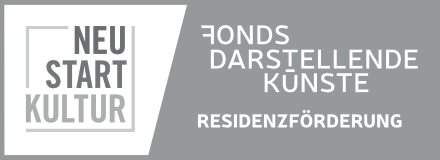
Our second week started with leaving Hansa Haus and moving in on the stage of Theatre im Ballsaal. Leaving one love and falling in love right away again. The level of how spaces are influencing our process has been impressive, especially when one thinks about the format of the podcast mainly connected to sound, and rarely to space.



Looking into ways of how podcasts and stages do not fit together, we of course are all the time bumping into ideas that combine the two dispositives in intriguing ways. Our second week has very much to do with listening and discerning. What does it mean to listen through the PAs on stage your own voice that is not there to create a direct affect in an audience that is present, but rather to perceive the whole stage as a recording studio? And yet, why would one need to listen to the voices we are listening to at the moment? What structures are able to catch our own attention in a way that is also catchy to our possible listeners?

Our days are starting and finishing with Random Talk sessions and in between we are choosing out of a list of performative practices. Most of the days we go through five or six of them. They grow with every iteration and open pockets of complexities. Sometimes a format would work miraculously by both offering a shareable format, but also supporting us into touching upon aspects of our three notions that mean much to us. Love, Empathy and Non-Belonging are sensitive topics that easily slip into generalisations and after such sessions the levels of energy in the room sink. But in the cases when a format we are trying becomes a supportive partner into a careful approach to them that is also loaded with performative charge, the energy levels bring joy.


One of the recorded lectures we turn to this week is by Rosi Bradotti and it addresses the contrast between neo-liberal (silly) optimism and the power of affirmation and joy when working on rethinking the possible constructs of living.
Another one is by Nikita Dhawan who asks how do we know if art is systemrelevant and to what system it is relevant if at all. Can a piece of art be relevant to the wrong system?
Our experience with different types of system is in the focus of this week when we look into patterns of leading conversations, but also into patterns of meaning making.
As a result of the day we spent with our mentor, Ole Frahm, we often ask ourselves: Is this easy to listen to while you do sth else? Is this unbearably self-referential? Whom does this voice belong to?
We are feeling a bit tired, but also quite eager to allow our practices grow denser in the coming week and see what challenges (technics-wise and content-wise) this will bring.

flausen+headquarters
Alexanderstraße 124
26121 Oldenburg
flausen+gGmbH
Klävemannstraße 16
26122 Oldenburg
Das überregionale Netzwerk flausen+ wird gefördert von der Beauftragten der Bundesregierung für Kultur und Medien über das Programm “Verbindungen fördern” des Bundesverbands Freie Darstellende Künste e.V.
Gefördert vom Fonds Darstellende Künste aus Mitteln der Beauftragten der Bundesregierung für Kultur und Medien im Rahmen von NEUSTART KULTUR.
Gefördert vom Fonds Darstellende Künste aus Mitteln der Beauftragten der Bundesregierung für Kultur und Medien.



